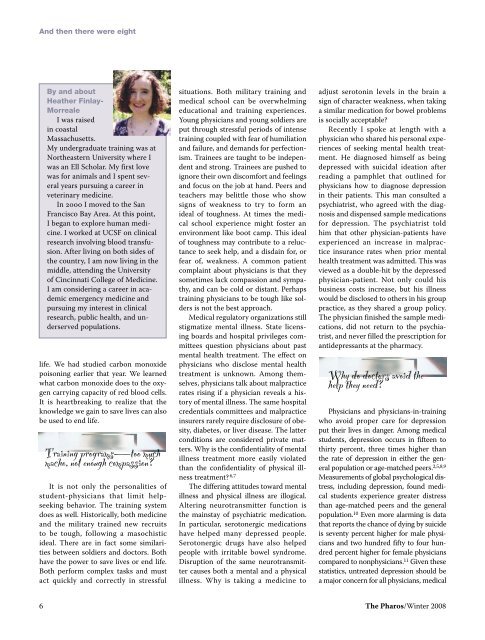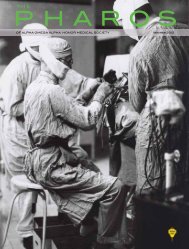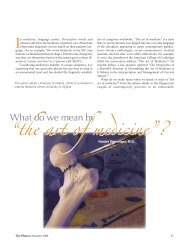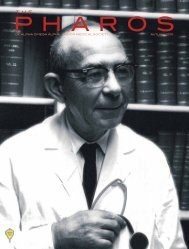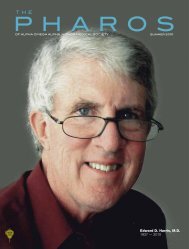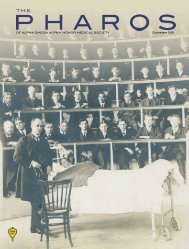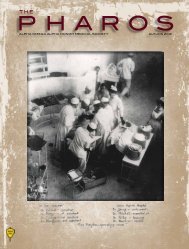Download The Pharos Winter 2008 Edition - Alpha Omega Alpha
Download The Pharos Winter 2008 Edition - Alpha Omega Alpha
Download The Pharos Winter 2008 Edition - Alpha Omega Alpha
Create successful ePaper yourself
Turn your PDF publications into a flip-book with our unique Google optimized e-Paper software.
And then there were eight<br />
By and about<br />
Heather Finlay-<br />
Morreale<br />
I was raised<br />
in coastal<br />
Massachusetts.<br />
My undergraduate training was at<br />
Northeastern University where I<br />
was an Ell Scholar. My first love<br />
was for animals and I spent several<br />
years pursuing a career in<br />
veterinary medicine.<br />
In 2000 I moved to the San<br />
Francisco Bay Area. At this point,<br />
I began to explore human medicine.<br />
I worked at UCSF on clinical<br />
research involving blood transfusion.<br />
After living on both sides of<br />
the country, I am now living in the<br />
middle, attending the University<br />
of Cincinnati College of Medicine.<br />
I am considering a career in academic<br />
emergency medicine and<br />
pursuing my interest in clinical<br />
research, public health, and underserved<br />
populations.<br />
life. We had studied carbon monoxide<br />
poisoning earlier that year. We learned<br />
what carbon monoxide does to the oxygen<br />
carrying capacity of red blood cells.<br />
It is heartbreaking to realize that the<br />
knowledge we gain to save lives can also<br />
be used to end life.<br />
Training programs—too much<br />
macho, not enough compassion?<br />
It is not only the personalities of<br />
student- physicians that limit helpseeking<br />
behavior. <strong>The</strong> training system<br />
does as well. Historically, both medicine<br />
and the military trained new recruits<br />
to be tough, following a masochistic<br />
ideal. <strong>The</strong>re are in fact some similarities<br />
between soldiers and doctors. Both<br />
have the power to save lives or end life.<br />
Both perform complex tasks and must<br />
act quickly and correctly in stressful<br />
situations. Both military training and<br />
medical school can be overwhelming<br />
educational and training experiences.<br />
Young physicians and young soldiers are<br />
put through stressful periods of intense<br />
training coupled with fear of humiliation<br />
and failure, and demands for perfectionism.<br />
Trainees are taught to be independent<br />
and strong. Trainees are pushed to<br />
ignore their own discomfort and feelings<br />
and focus on the job at hand. Peers and<br />
teachers may belittle those who show<br />
signs of weakness to try to form an<br />
ideal of toughness. At times the medical<br />
school experience might foster an<br />
environment like boot camp. This ideal<br />
of toughness may contribute to a reluctance<br />
to seek help, and a disdain for, or<br />
fear of, weakness. A common patient<br />
complaint about physicians is that they<br />
sometimes lack compassion and sympathy,<br />
and can be cold or distant. Perhaps<br />
training physicians to be tough like solders<br />
is not the best approach.<br />
Medical regulatory organizations still<br />
stigmatize mental illness. State licensing<br />
boards and hospital privileges committees<br />
question physicians about past<br />
mental health treatment. <strong>The</strong> effect on<br />
physicians who disclose mental health<br />
treatment is unknown. Among themselves,<br />
physicians talk about malpractice<br />
rates rising if a physician reveals a history<br />
of mental illness. <strong>The</strong> same hospital<br />
credentials committees and malpractice<br />
insurers rarely require disclosure of obesity,<br />
diabetes, or liver disease. <strong>The</strong> latter<br />
conditions are considered private matters.<br />
Why is the confidentiality of mental<br />
illness treatment more easily violated<br />
than the confidentiality of physical illness<br />
treatment? 6,7<br />
<strong>The</strong> differing attitudes toward mental<br />
illness and physical illness are illogical.<br />
Altering neurotransmitter function is<br />
the mainstay of psychiatric medication.<br />
In particular, serotonergic medications<br />
have helped many depressed people.<br />
Serotonergic drugs have also helped<br />
people with irritable bowel syndrome.<br />
Disruption of the same neurotransmitter<br />
causes both a mental and a physical<br />
illness. Why is taking a medicine to<br />
adjust serotonin levels in the brain a<br />
sign of character weakness, when taking<br />
a similar medication for bowel problems<br />
is socially acceptable?<br />
Recently I spoke at length with a<br />
physician who shared his personal experiences<br />
of seeking mental health treatment.<br />
He diagnosed himself as being<br />
depressed with suicidal ideation after<br />
reading a pamphlet that outlined for<br />
physicians how to diagnose depression<br />
in their patients. This man consulted a<br />
psychiatrist, who agreed with the diagnosis<br />
and dispensed sample medications<br />
for depression. <strong>The</strong> psychiatrist told<br />
him that other physician- patients have<br />
experienced an increase in malpractice<br />
insurance rates when prior mental<br />
health treatment was admitted. This was<br />
viewed as a double-hit by the depressed<br />
physician- patient. Not only could his<br />
business costs increase, but his illness<br />
would be disclosed to others in his group<br />
practice, as they shared a group policy.<br />
<strong>The</strong> physician finished the sample medications,<br />
did not return to the psychiatrist,<br />
and never filled the prescription for<br />
antidepressants at the pharmacy.<br />
Why do doctors avoid the<br />
help they need?<br />
Physicians and physicians-in- training<br />
who avoid proper care for depression<br />
put their lives in danger. Among medical<br />
students, depression occurs in fifteen to<br />
thirty percent, three times higher than<br />
the rate of depression in either the general<br />
population or age- matched peers. 2,5,8,9<br />
Measurements of global psychological distress,<br />
including depression, found medical<br />
students experience greater distress<br />
than age- matched peers and the general<br />
population. 10 Even more alarming is data<br />
that reports the chance of dying by suicide<br />
is seventy percent higher for male physicians<br />
and two hundred fifty to four hundred<br />
percent higher for female physicians<br />
compared to nonphysicians. 11 Given these<br />
statistics, untreated depression should be<br />
a major concern for all physicians, medical<br />
6 <strong>The</strong> <strong>Pharos</strong>/<strong>Winter</strong> <strong>2008</strong>


